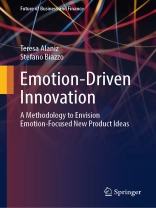It is now widely recognized that the emotional dimension of products and services is a critical success factor in many sectors. Generating products with significant emotional features is a complex challenge, as professionals responsible for designing and developing new products should be able to focus the design effort on eliciting specific emotions. But how do designers prepare themselves to convey emotions through the products they design? How do they know how to provoke certain emotions? To obtain the benefits that the knowledge of emotions can bring when it is integrated into the design process, professionals need to be assisted with approaches to apply the knowledge of emotions systematically and strategically.
This book presents the development of a process to support product design teams to envision emotion-focused new product ideas – Emotion-Driven Innovation (E-DI). The E-DI process supports designers in identifying the occurrence of emotions in a certaincategory of products present in the market and applying this information to make strategic decisions when defining the emotional intentions for the new product. It also helps to focus their creative thinking to develop strong and meaningful emotion-centric new product ideas. This book targets a professional audience wanting to learn more about this process and provides useful tools and frameworks that can be applied in real-life cases.
Tabela de Conteúdo
The challenges of generating Emotion-Focused product ideas.- Process creation: structuring the Emotion-Driven Innovation.- The language of Emotion-Driven Innovation.- Process development: testing the E-DI in academic environments.- Process validation: towards the application of E-DI in real design practice.- Emotion-Driven Innovation – The process.-Emotion-Driven Innovation: An Inside-Out Approach to Design
Sobre o autor
Teresa Alaniz works as the Director of Design Delivery and Strategist at Ni EW, an internationally award-winning Boutique Advisory firm based in Italy. She assists companies of various sizes, from small businesses to corporate entities, in their digital transformation. Her approach involves applying design methodologies across a range of sectors, including government entities, traditional businesses, and rising startups, to help them succeed in competitive markets through tailored consultancy. Teresa received her Ph.D. in Management Engineering from the University of Padua, Italy. Her research focused on developing a process for envisioning emotion-focused new product ideas. She also holds an MSc in Industrial Design from the University of Porto, Portugal. Prior to this experience, she was a Professor at the Monterrey Institute of Technology and Higher Education in Mexico, teaching courses in creativity and innovation, user experience, and entrepreneurship. Stefano Biazzo is Professor of Innovation Management at the University of Padua (Italy). He has published extensively both in national and international journals on product innovation and organizational innovation issues. Stefano Biazzo has over 20 years of experience in organizational change management, focusing on developing and disseminating concepts, methodologies, and tools to enhance firm performance through the adoption of innovation and foster continuous improvement. He has recently published with Springer “Product Innovation: Intelligence, Discovery, Development” (with Professor Roberto Filippini) and “Digital Business Models for Industry 4.0” (with Professor Carlo Bagnoli et al.).












